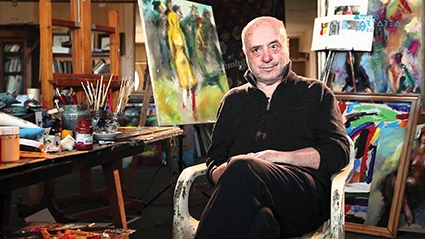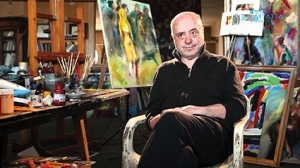INTERVIEW: Zurab Nijaradze, Painter
Together with the BI Auction for Art, GEORGIA TODAY continues its monthly feature presenting famous Georgian painters to our readers.
This issue, Zurab Nijaradze is in the spotlight.
Now in his eighties, he’s known for transforming the Georgian art of painting, twice expelled from the Tbilisi State Academy of Arts for formalism, later appointed rector of the same for the term 1982 to 1987. His works are kept in the major museums and private collections in Georgia and Germany, the US, Brazil and Russia.
A conversation with Zurab Nijharadze is like time travel, transcending into a history of art, philosophy, and culture, accumulated in his art, inspired by and prolonged in the expressive world of his paintings.
What made you decide to be a painter?
I don’t think there was anything special in my choice. Every child has a creative impulse, the process of creating something makes children happy. They are happy to see the result, too, and that moment of joy when you see the final result of your creation is very important for the area we artists work in. When children grow older their interests change; they often forget those impulses and interests. I didn’t: I followed that path. There were no specific preconditions for me becoming a painter, for me it was quite organic.
Slowly you come up with the challenges that you have to overcome, that’s what brings reason to it, and base. Harmony is very important and nature already has the necessary aesthetics in itself. Every human being is in search of harmony and beauty. These notions take different forms and the bases of aesthetics are slowly formed. Again, if we look at little children, when you bring crayons to them, they are happy. But why? Because they create something or because they like the material with which they draw? You can make a very interesting conclusion on the nature of creativity and the nature of art from that.
What is the role of art and what is the role of the material used for it in the actual process?
I remember, once a young woman asked me about one of my paintings, what I wanted to express with it, and I answered that I just wanted to paint. I use color and material to tell a certain story.
What does the creation process consist of for you?
It’s changeable- it’s a process that is constantly enriching and very different. The goal is to bring new quality and new life to the colors and materials we use. Imagine a brick. A brick building is built on the principle of weight; it must reflect the quality of the material. Brooklyn Bridge has different aesthetics and architectonics. It has a principle of stretching; new materials bring new aesthetics. It’s important to know and realize where you stand artistically, what your starting point is. The work must be visible. As Stanislavsky said, you must come from the nature of things. The specifics of each art form are born when you can’t swap it for anything else. You can’t swap a theater for music or a poem for a novel. As a painter you should use your own ways of expression and the “language”that is authentic to painting. What is the art of painting for? Eugene Delacroix even created a theory of warm and cold colors. It’s the unity of them that makes an unforgettable impression on the viewer, later developed by Impressionists who left interiors and went out into nature to explore its light and colors. Colors should be real, vivid; they must not be dead. Material is essential.
You can’t find anything if you don’t know what you’re looking for. It’s like before you fall in love, you may not know what love is, but love exists nevertheless; it’s there, and, subconsciously, you know and feel it. All of it is connected and related and it’s hard to say where it comes from. The creative impulse is about making your work evident and visual for others. It’s a cognitive process. An artist should always work on the maximum verge of his limit. Truth lays in getting as closer to that limit of expression as you can. German philosopher Heidegger says that a man can only see the truth while dying, but I don’t believe in that.
Is there anything you regret not doing in your work?
Yes. Even when I’m working, I already regret the things I’m not doing or haven’t done. It’s always like that. Probably the dramatism of our lives is in the fact that we think we’re not the ones we want to be.
In one of your interviews you say that at the end the only thing left will be something that is above time. What is that for you?
Everything metaphysical is timeless- events obey the time, but the potential from which they are formed and born is above time… there is no discontinuity… the world is continuum!











